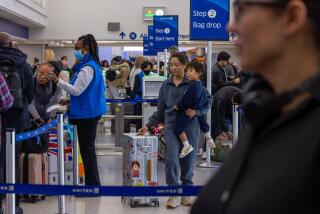New facility highlights Black Worker Center’s mission
- Share via
Beads of sweat dotted Terrence Mason Jr.’s forehead Saturday morning as he brushed white primer on a metal pipe outside the faded South Los Angeles building that houses the Los Angeles Black Worker Center.
Mason, a sheet metal worker, was among dozens of electricians, painters and other construction workers who showed up in work boots and hard hats, tool belts strapped around their hips, to lend their skills to fixing up the center’s new headquarters in the Paul Robeson Community Center on South Vermont Avenue.
The occasion was a “day of service and community” to spotlight a fledgling movement aimed at promoting local hiring policies that create career construction jobs for black workers.
“We’re fighting to reverse the black job crisis,” said Lola Smallwood Cuevas, project director of the UCLA Downtown Labor Center and a creator of the Black Worker Center, where the mission is to study and highlight the needs of African Americans in the Los Angeles labor market. Landlord Oneil Cannon, 93, offered a year’s free rent in exchange for renovations.
There was a time when African Americans in Southern California could find jobs in aerospace, automaking and other industries that could boost their families into the middle class. But by 1985, many of those jobs, along with janitorial and hospitality work, had evaporated.
Data show that black workers have also been hit hardest by the recession. The federal Bureau of Labor Statistics reported that black unemployment in August was 16.3%, contrasted with 8.7% for whites, 12% for Latinos and 9.6% overall. The overall unemployment rate in California was higher, at 12.4% last month, according to the state Employment Development Department.
Under a withering sun Saturday, Los Angeles County Supervisor Mark Ridley-Thomas told the assembled group that $900 million of public projects were scheduled to begin soon, not including Phase 2 of the Expo light-rail line and other transit projects also expected to generate thousands of jobs.
“There’s a lot of work,” he said. “We ought to have access to it.… We don’t want to do it … catch as catch can.”
With big transit projects and LAX renovations in the near future, Cuevas said training programs would be crucial to ensuring a flow of new workers into the job market.
Among the volunteers was Alisha Doyle, 27, who is learning how to work with power tools and apply for apprenticeships through a program called WINTER, Women in Non Traditional Employment Roles.
Madelyn Broadus, who last week received her journeyman’s license as a sheet metal worker but, like many other volunteers, is unemployed, said her goal was to get more women like herself into well-paying construction jobs. A Boston University graduate, Broadus said she got the “bug” for construction after never earning more than $18.50 an hour as a mortgage loan processor.
Broadus, who previously worked on L.A. Live and the downtown Marriott hotel, said supervisors often “don’t know where to put me.” But she added she was capable and eager. “I will put my life on the line,” she said.
More to Read
Sign up for Essential California
The most important California stories and recommendations in your inbox every morning.
You may occasionally receive promotional content from the Los Angeles Times.











